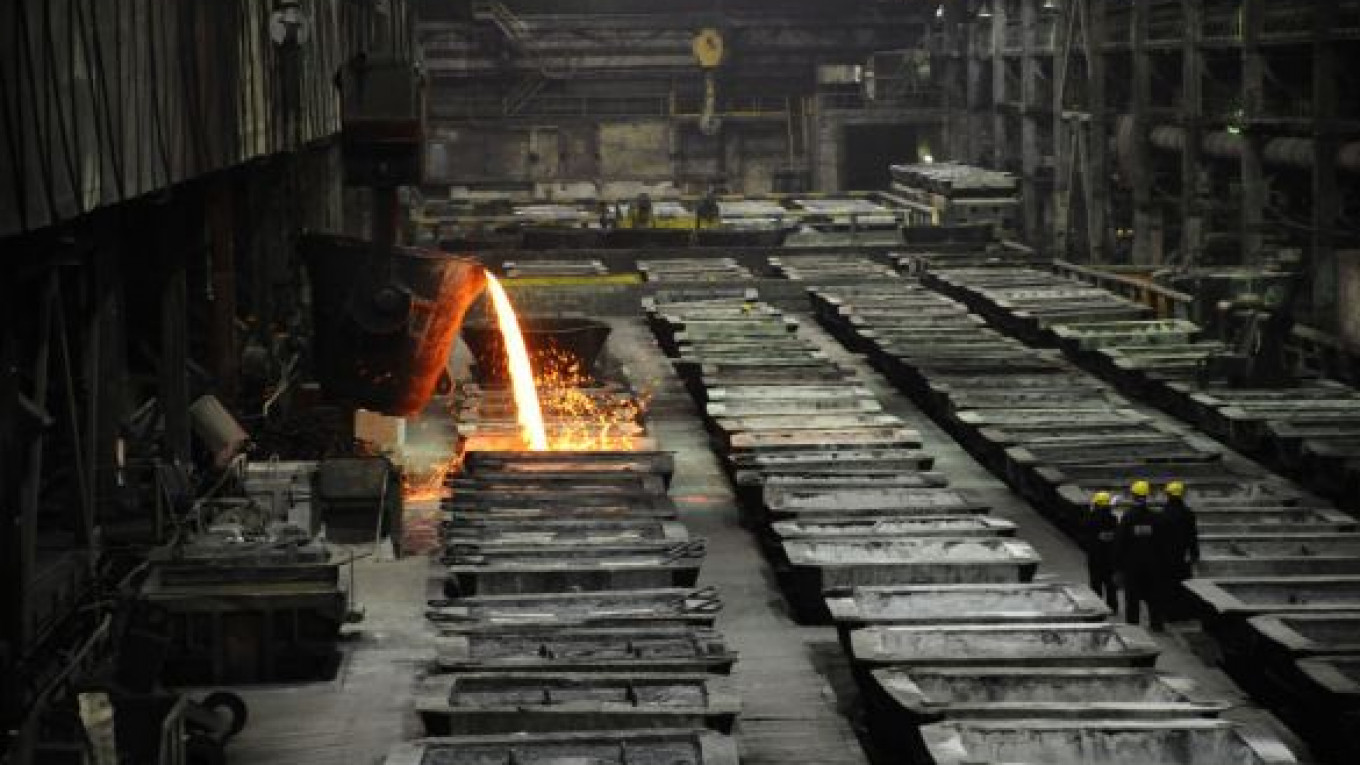The co-owners of Norilsk Nickel have resumed talks to settle the long-standing dispute over control of the nickel and palladium giant, in a move that could result in replacing the company’s management.
The two largest shareholders of Norilsk Nickel — Vladimir Potanin’s Interros holding and Oleg Deripaska’s RusAl — have returned to the negotiations table,? Norilsk Nickel’s chief executive Vladimir Strzhalkovsky told journalists Wednesday.
“Yes, I know that the meetings are ongoing,” he said, Reuters reported.
He said that the talks will become more intensive over the next month, adding that he is not involved in the talks.
Interros, which owns 28 percent in the nickel company, and RusAl, which holds a 25 percent stake,? have been fighting intermittently since 2008 over the company’s corporate governance, board structure and dividend policy, with last year’s negotiations coming to no avail.
But this time the talks could result in changes in the company’s management, as a source close to Norilsk Nickel’s shareholders said that they are discussing replacing Strzhalkovsky.
“It’s a key issue now,” said the source, who spoke on condition of anonymity because the information is confidential.
Both RusAl and Interros declined to comment Wednesday.
Norilsk Nickel said that there’s no reason for changing the management, which had secured a stable financial performance and capitalization growth and modernized the manufacturing facilities.
The company met its obligations during the financial crisis of 2008 thanks to effective management, without carrying out massive layoffs, it said in e-mailed comments.
RusAl has been pushing for Norilsk Nickel to get professional management with industry background. The aluminum producer argued that the growth of the nickel company’s capitalization is inhibited by the company not being run properly.
Replacing Norilsk Nickel’s CEO would be positive for the company, as it might increase its transparency, Alfa Bank analyst Andrei Lobazov said, referring to RusAl suing Norilsk Nickel for failing to provide access to the records of the nickel company’s board meetings and other documents.
Although the previous negotiations between RusAl and Interros didn’t yield any results, the companies are likely to find a compromise this time, he said by telephone. The government has indicated that it’s interested in a speedy solution, he added.
President Vladimir Putin has repeatedly said that the ongoing conflict damages Norilsk’s operations. “We hope that the disputes between Norilsk Nickel’s owners will be resolved in the near future for the benefit of the company’s development,” he said in August.
The issue was brought up again at a meeting of the presidential energy commission last week, where Putin criticized Norilsk Nickel over significant spending on buybacks over the last few years, the source close to the nickel company’s shareholders said.
Putin’s spokesman Dmitry Peskov could not be reached for comment Wednesday.
The talks were resumed after Deripaska’s recent claim at a meeting with Prime Minister Dmitry Medvedev that they had stalled, Kommersant reported Wednesday, citing a source close to Norilsk Nickel’s shareholders. Potanin met with Medvedev the following day, the report said.
Resuming negotiations could be beneficial for the nickel company, as the “management’s focus might shift from the ongoing conflict towards operating and strategic issues,” VTB Capital said in a research note.
There might be various scenarios of settling the conflict, with RusAl selling its stake being one possible option, VTB Capital said.
Interros spokesman Andrei Kirpichnikov said the company will be satisfied with any outcome that would help to cease the long-standing battle.
Interros, which is seeking to gain control over the nickel company, is preparing to apply to the Federal Anti-Monopoly Service for permission to increase its stake in Norilsk Nickel to 75 percent, Kirpichnikov said without elaborating.
Related articles:
A Message from The Moscow Times:
Dear readers,
We are facing unprecedented challenges. Russia's Prosecutor General's Office has designated The Moscow Times as an "undesirable" organization, criminalizing our work and putting our staff at risk of prosecution. This follows our earlier unjust labeling as a "foreign agent."
These actions are direct attempts to silence independent journalism in Russia. The authorities claim our work "discredits the decisions of the Russian leadership." We see things differently: we strive to provide accurate, unbiased reporting on Russia.
We, the journalists of The Moscow Times, refuse to be silenced. But to continue our work, we need your help.
Your support, no matter how small, makes a world of difference. If you can, please support us monthly starting from just $2. It's quick to set up, and every contribution makes a significant impact.
By supporting The Moscow Times, you're defending open, independent journalism in the face of repression. Thank you for standing with us.
Remind me later.


